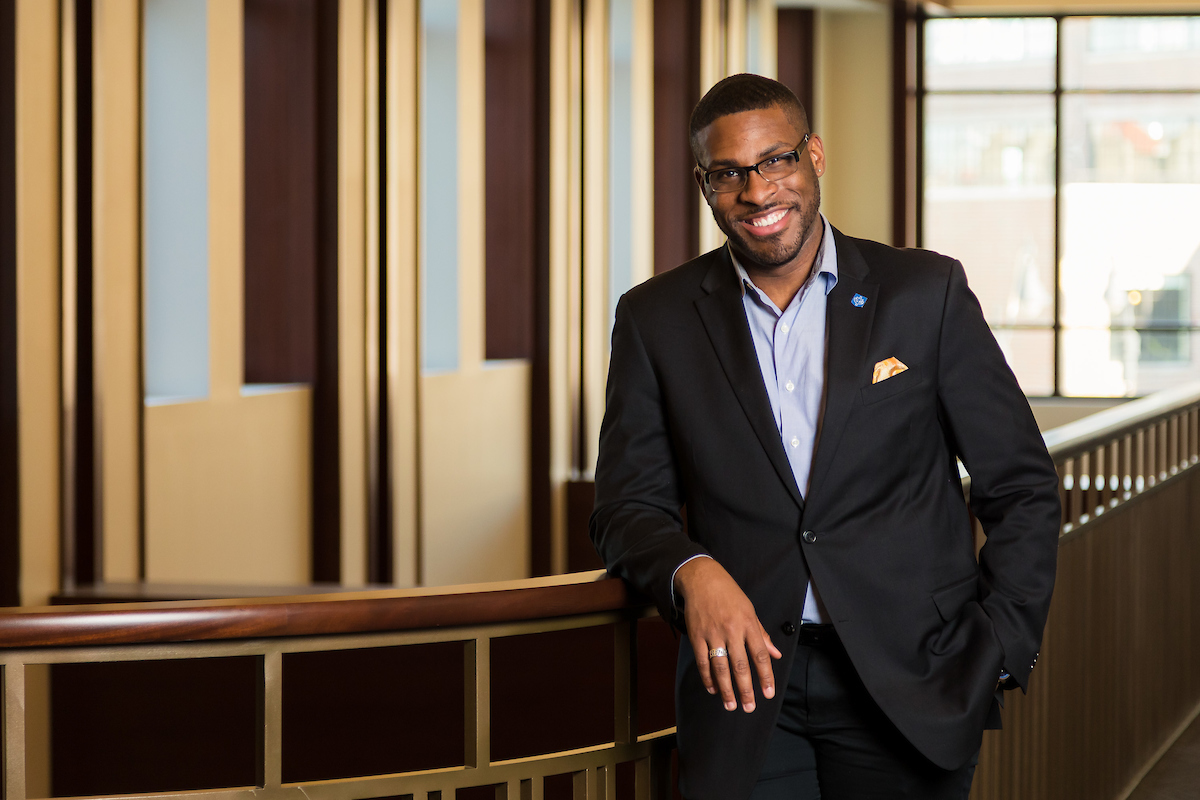 Willord Simmons is a School of Music student studying music education. His efforts include working with a professor from the University of Iowa to conduct research about music programs in prisons. (DePaul University/Jeff Carrion)
Willord Simmons is a School of Music student studying music education. His efforts include working with a professor from the University of Iowa to conduct research about music programs in prisons. (DePaul University/Jeff Carrion)
Originally from Victoria, Texas, McNair Scholar and senior music education major Willord Simmons was drawn to Chicago for many reasons, including DePaul’s outstanding music program, although he admits he was nervous for his audition.
“I knew how amazing DePaul’s music school is, so I wasn’t sure I’d get in, though I really hoped I would,” he says. Once accepted to the music school in 2015, Simmons knew he had to come here.
“DePaul has a good Vincentian mission, which matters a lot to me,” he says. “DePaul also is located in the middle of a beautiful city that is incredibly different from my hometown in Texas.”
Once at DePaul, Simmons began to take advantage of everything the school has to offer. In 2016, he began working for the Division of Student Affairs as an orientation leader. By 2017, while still working in Student Affairs, Simmons became a McNair Scholar, a DePaul program geared toward first-generation and underrepresented students interested in graduate school programs.
Since becoming a McNair Scholar, Simmons has managed to maintain an impressive grade point average while continuing to work in Student Affairs in various roles. He also has collaborated with professionals in undergraduate research, as well as conducted his own research.
During the summer of 2018, Simmons spent time at the University of Iowa assisting Mary Cohen, a professor of music education who focuses on prisons. Cohen is responsible for a music program called the Oakdale Prison Choir, where she conducts workshops that allow incarcerated people to collaborate with musicians and create music reflective of their experiences. The choir performs the music they have created and, according to Simmons, the project has gained a lot of momentum and has had an impact on many people.
“Through my work, I was able to contribute material to a much-needed book by Dr. Cohen on music programs in correctional facilities,” Simmons says. “My part in this research included gathering historical information for a contextual chapter of the book.”
Simmons also assisted Cohen by formulating a quantitative method for documenting the effects of the program by comparing disciplinary infractions against choir participation in the prison.
“The hypothesis states if the incarcerated individual is active with the choir, then they will have fewer infractions, and might even have an increase in positive contributions to the prison community,” Simmons says.
Simmons’ own research stemmed from observing how music is taught in the prison and notes instructional styles used in classrooms outside of the prison were being used with the inmates. Through his research, Simmons decided he wanted to make an argument against traditional music education in prisons, and substituting instead methods that could be more beneficial for incarcerated individuals.
His project, titled “Music Classroom or Prison: Unlocking Awareness of how Traditional Music Making can Restrict Creative Music Making,” argues the use of traditional music education styles with prison inmates limits creativity by failing to allow inmates to engage in musical exploration. Simmons endorses culturally responsive teaching and creative music making in his work, which encourages improvisation and full expression.
In his research Simmons compared teaching methods in three Chicago schools’ music education classrooms to three music programs in correctional facilities for their use of creative music making strategies. Ultimately, Simmons makes recommendations for teachers in music classrooms to incorporate the creative music making strategies that have proven beneficial to the incarcerated.
He has taken his research to both the Undergraduate Research Symposium at the University of Iowa as well as the McNair Research Symposium. Simmons also will submit a research paper to the Undergraduate McNair Research Journal.
Simmons has learned a lot about conducting research from his summer experience, but his work and the network he has established will ultimately help him achieve his goal of pursuing a doctorate degree.
“Pursuing a doctorate in education can be challenging because of the experiential requirements of these types of programs,” Simmons notes. He believes his undergraduate research will contribute significantly to this requirement.
Simmons has a lot to look forward to as his undergraduate time at DePaul nears its end, but he is excited about his current work, too. Now in his final year in the music education program, he is working as a student teacher at Lincoln Elementary with the middle school band, which consists of students from fifth to eighth grade.
“I play the flute at DePaul, but teach pretty much everything in the classroom, which scares me sometimes,” he laughs.